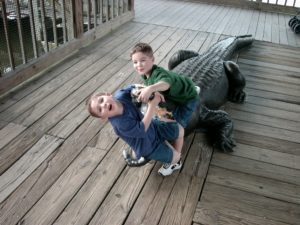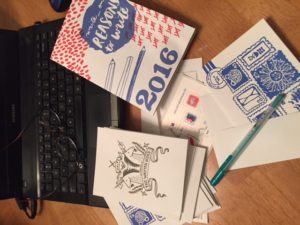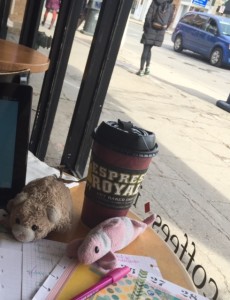 “Dad would like you to drive the van,” my mom says to me. “It’s easier for him to get in and out of it.”
“Dad would like you to drive the van,” my mom says to me. “It’s easier for him to get in and out of it.”
Despite my dad’s notoriously poor behavior as a passenger, I immediately respond, “Sure, I’ll drive.” Then I conjure an image of how the rest of my family will react when they find out that I’ve pulled the short straw. Relieved, they will celebrate by high-fiving one another and cheering, “Woo-hoo! Kelly has to drive!”
Soon thereafter, on a sunny and warm spring morning, I arrive as promised at my parents’ house, where Mom and Dad have been waiting with my sister and brothers. Waiting is the most popular item on the day’s agenda. It starts with the family waiting for me. It is to continue downtown at Henry Ford Hospital where we will stew for eight hours and hope that dad gets to come home with us after his surgery.
Dad sits up front beside me. Everyone else piles into the seats behind us, and we begin our trek to the hospital.
“Your dad likes to be early.” Mom doesn’t have to remind us of that. We know it. Dad is a morning person, and he’s never late.
When my siblings and I were children and living at home, we had Saturday mornings to look forward to Dad waking us up. He would step into our rooms while we slept and begin a loud phonetic rendition of the bugle call, “Reveille.” Then he’d sing these words in the same cadence:
It’s time to get up!
It’s time to get up!
It’s time to get up in the morning!
It’s time to get up!
It’s time to get up!
It’s time to get up in the day!
Dear Ol’ Dad had borrowed that morning routine from his camping days with the Air National Guard from 1954-1962. Other young men were being called up by the United States Army to serve in far-away places. Dad thought that by enrolling in the Guard, he had a better chance of staying close to home and finishing his six-year-long apprenticeship to become a printer. All worked out even better than he had planned. About half-way through his eight years of service, he met my mom, who had come to vacation in Michigan.
Dad enjoyed getting up at the crack of dawn and I think he wanted his family to like—or at least embrace—mornings too. Whenever we took a road trip, we’d rise before daybreak. The sky was dark; the air was crisp and chilly. There was no time to waste. Other people weren’t around to tie up the freeways. We had at least three hours to get ahead of everyone else.
On the morning drive to the hospital, I am reminded of how hard it must be for Dad to have to relinquish control of the steering wheel. He’s used to being the one behind the wheel. He drives everywhere he and Mom go, and sometimes he even drives me where I need to go.
Practically every year, Dad takes me to the Frank Murphy Hall of Justice where I complete my annual stint of jury duty. He spoils me. I don’t have to go into downtown Detroit alone, find a parking space, and walk by myself to the courthouse.
“I’ll drive you,” he insists.
Mom comes along and the two wait for me to get a break or to be excused for the day. They wile away their time at Greek Town Casino and then the three of us get lunch. Our little arrangement is something pleasant that I think we all look forward to.
Today, however, I experience familiar and familial pressure as I drive downtown. I go an acceptable five miles over the speed limit. Dad gruffly says, “Slow down!” Moments later, when I drive at the posted speed limit, Dad suggests that I could “go a little faster.” All the time, he foresees potential problems with traffic and warns, “Watch out!” “Take it easy!” “Give ‘em a little more room.”
I force myself to relax, despite the tension everyone in the van is feeling. There’s a hush that comes over us. No one wants to distract me from focusing on Dad’s instructions.
“The road coming up has a big pothole. It’s just past the light. See it?”
When I was sixteen, I had my first car accident—which wasn’t my fault. My dad didn’t seem mad at all. During college, when I had a second car accident which was my fault, he again showed only concern for whether or not I was alright.
I’m sure he’s not remembering these things that happened decades ago. He treats my brothers and sister the same when they drive. He just likes to be the one in charge and taking care of everyone else.
Having worked as a printer for The Detroit Free Press for over forty years, Dad knows the city’s history, the parks, the office buildings, the old stadiums, the bars and hang-outs, and most importantly, the back ways into town. He skillfully directs me down streets and through neighborhoods that I wouldn’t be comfortable in if I were by myself.
Dad explains that the humming bridge over the Rouge River needs to have water poured onto it to cool it down when it gets hot. He says that when he was a little boy, the Army responded to race riots by camping out in Clarke Parke. Later, more race wars took place in the 1960s, and the National Guard came to keep order but they didn’t have ammunition in their guns. Army paratroopers came in next and shot a bunch of people.
We drive east on Fort Street from downriver and pass by desolate Woodmere Cemetery, where several generations of my ancestors are buried. It has been over twenty years since we visited. Back then, a recorded voice was blasted over a loud speaker to tell women not to stop at the gravesites alone. Today, I wish I could forego this drive to the hospital and take a detour inside the wrought iron, gated yard in order to kneel beside my grandparents’ graves and reminisce.
I would rather not have to face the fact that my dad has bladder cancer. I don’t want him to have to undergo surgery, to be poked and prodded, to be in pain and discomfort.
Dad seems to calm the more he talks about places that he’s passed thousands of times. We see the old, abandoned Greyhound Bus station and turn at the corner of 14th Street. A block down at West Lafayette is Green Dot Stables. Dad tells us, like he had many times before, that the guy who opened it used to be a harness racing jockey. Dad doesn’t seem to notice the graffiti and burned-out buildings along our route. Unlike him, my brothers and sister are squirming in their seats because they would have rather taken the freeway. Doesn’t Dad realize that I-75 would be faster?
I’m not nervous about driving through poor parts of town with my family, mostly because my dad is sitting right beside me. Despite the fact that he’s turning eighty this year, I still believe he’ll keep us safe, no matter what.
It occurs to me that my father is behaving like an imperfect tour guide. I consider his insider’s knowledge of Detroit, his familiarity with the roads, and his ability to tell great stories. I set aside the fact that Dad has little to no patience when behind the wheel of a car, and I get a crazy idea. I blurt out, “You should be an Uber driver!”
Laughter erupts in the van. I sneak a peek at my dad and can tell that, for a brief moment, he isn’t thinking about cancer, pain, and surgical complications. He’s not worried or stressed. He’s simply smiling in response to my ludicrous suggestion.
That moment was worth waiting for.



